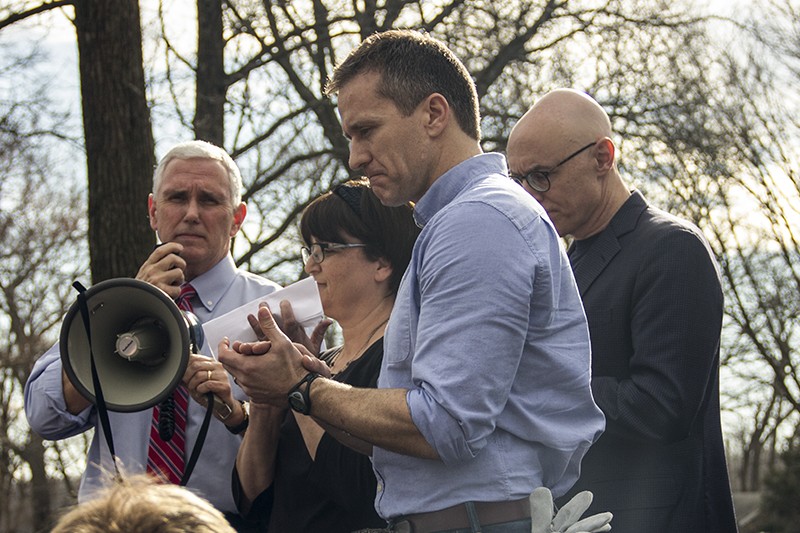
DANNY WICENTOWSKI
Eric Greitens, shown here with Vice President Mike Pence, has gone from presidential aspirations to political pariah.
Today, Missouri's governorship passes to this guy, and Eric Greitens becomes just your run-of-the-mill Rhodes Scholar, former Navy Seal and subject of a special House committee report describing "credible" allegations that he trapped a St. Louis woman in his basement, coerced her into oral sex and took a blackmail photo to safeguard his reputation.
And yet despite Greitens' impending exit from public office, that House committee isn't ending its investigation — at least, not yet. It's still demanding that Greitens' political nonprofit, A New Missouri, comply with a subpoena to produce potentially revelatory internal documents about the money it funneled to his election efforts. The group's unnamed donors are reportedly panicking at the prospect.
What concerns attorney Mark Pedroli, who is suing Greitens to obtain data from the text-destroying app Confide, is whether the House committee will stay on it.
"It would be an absolute travesty if they walk away from the dark money investigation," Pedroli told RFT on Thursday afternoon. Hours later, the a spokesman for the Missouri House of Representatives told the Kansas City Star that it still expects A New Missouri to abide by the court-ordered deadline — today — to turn over those documents.
Pedroli represents fellow attorney Ben Sansone and the Sunshine Project. In December, a month before the allegations of blackmail by Greitens broke, Pedroli sued the governor and his staff, challenging their use of the Confide phone app to hide communications that he believes should be public under the state's Sunshine law. Attorney General Josh Hawley also opened an official investigation into whether the governor and his staff violated the law by using an app that, fundamentally, exists to erase records.
In March, Hawley's office announced the end of its investigation, concluding that the governor hadn't broken any laws. However, the investigation was widely criticized for its lack of, well, investigation. The Attorney General's office didn't interview the governor and didn't actually recover any text messages, instead relying on statements from Greitens' staff, which insisted Confide was only used for logistical planning and other minor business.
Pedroli, meanwhile, kept hammering at the governor through his lawsuit. That included an interrogatory, or a formal request for information, from the governor. Those questions and responses seem to reveal far more than Hawley's half-hearted investigation.
Specifically, Pedroli notes that Greitens answered most of the questions with variations of "neither admit or deny." That, for instance, was Greitens' non-response to a request that he identify which individuals he communicated with using Confide. It was the same with the demand, "Admit that you have used Confide to communicate with staff, employees, volunteers or agents of A New Missouri Inc." — the aforementioned political nonprofit.
To that, Greitens and his attorneys objected that the question was targeting
"information from the governor not involving public business," and was therefore irrelevant. The response also contended, "The Governor has only ever used the application in a way that the law allows."
However, to Pedroli, the governor's reliance on "neither affirm or deny" only strengthens the lawsuit's position — particularly because there were issues the governor was willing to deny conclusively, such as the question of whether he'd used Confide to discuss legislation. (He says no.)
It's "curious," says Pedroli, that the governor was willing to make specific denials in some areas and not others.
"The governor has refused to admit or deny whether he used Confide to communicate with outside groups. They didn’t answer. They didn’t deny," he points out. "They had an opportunity and they didn’t."
For Greitens, the luxury of non-responses will be short-lived. On Wednesday, one day after Greitens announced his resignation, Circuit Judge Jon Beetem ordered Greitens' attorney to provide a list of everyone in the soon-to-be-ex-governor’s office who used Confide. The judge also asked that forensic duplicates be made of the data on the individuals' phones.
Both of those tasks come with a deadline: 1 p.m. today.
Confide Update: LAST NIGHT Judge Beetem issues new ORDER for Governor Greitens to answer questions TODAY at 1:00 PM and ordered the Office of Governor to preserve data on their personal cell phones. This investigation will not end. We fight on... pic.twitter.com/1hrvVjJRNE
— Mark Pedroli (@MarkPedroli) June 1, 2018
Obviously, a major complication here is that Confide deletes text messages, but Pedroli tells RFT that he's confident the data can still be recovered. What that data could reveal, he suggests, might be the method by which Greitens coordinated with nonprofits that were pouring millions of dollars into his campaign.
"Dark money and secret communication networks go hand-in-hand," Pedroli says. And, in light of Greitens' previous non-responses, Pedroli believes Greitens is hiding something, and that the truth is lurking in those text messages. "I have an even stronger belief that Confide was used to communicate with these dark money groups," the attorney says.
Granted, this is a lot of speculation. Pedroli is fighting for access to records precisely because we don't know what's in them. Still, one of Greitens' former campaign aides, Michael Hafner, has claimed that the campaign worked to conceal donors' identities by funneling donations through limited liability companies. If there was coordination, there was communication. Could that be where Confide came in?
The issue may not rest on speculation for long. Between Judge Beetem's orders torn over personal cell phones and the documents from A New Missouri, Pedroli is hoping the ambiguities will soon settle into facts. "We're about to get a whole lot more answers," he says. "We're going to start seeing the contours of this secretive communications network."
What's still not clear, however, is how long House investigative committee will pursue Greitens' dark money network. Earlier this week, House Speaker Todd Richardson told the Kansas City Star, "the House’s jurisdiction over those matters will go away at some point with the governor's announcement." It's not clear what that means for the committee's subpoena power.
Even if the committee closes up its investigation, however, Pedroli plans to continue to use the Confide lawsuit to to dig into the Greitens' dark money machine. Still, that will only prove possible if Greitens and his staff actually used Confide to talk to the nonprofit's organizers, and not, say, phone calls or invisible ink or smoke signals.
Pedroli would much prefer the House committee to keep digging: "Losing the House's investigation would possibly damage and certainly slow down the ability for the residents of Missouri to get answers."
Greitens may be soon gone, but Pedroli warns that Missouri's campaign finance system remains open to exploitation from other candidates willing to exploit its loopholes.
"Walking away," he cautions, "only ensures that it's going to happen again."
Follow Danny Wicentowski on Twitter at @D_Towski. E-mail the author at [email protected]





